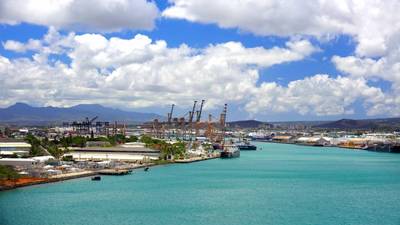Hawaii Congressman Introduces Anti Jones Act Legislation
Hawaii Congressman Ed Case has introduced three bills in Congress to reform Merchant Marine Act of 1920 (commonly referred to as the Jones Act), which he states “artificially inflates the cost of shipping goods to Hawaii”.
Case’s three measures and their proposed amendments to the Jones Act are:
- the Noncontiguous Shipping Relief Act, which exempts all noncontiguous U.S. locations, including Hawaii, from the Jones Act;
- the Noncontiguous Shipping Reasonable Rate Act, which benchmarks the definition of a “reasonable rate” which domestic shippers can charge as no more than 10% above international shipping rates for comparable routes; and
- the Noncontiguous Shipping Competition Act, which rescinds the Jones Act wherever monopolies or duopolies in noncontiguous Jones Act shipping develop.
“My three bills aim directly at one of the key drivers of our astronomically high cost of living in Hawaii and other locations in our country that are not part of the continental U.S,” Case said. “Because the Jones Act severely limits the supply of shipping to and from our communities, it has allowed a very few companies to control our very lifeline to the outside world and as a result command shipping rates way higher than the rest of the world.
Located almost 2,500 miles off the West Coast, Hawaii imports well over 90% of its life necessities, including food and other consumer goods, construction and housing supplies, and raw materials for Hawaii industries like agriculture, by ocean cargo only.
“At a basic level, the everyday goods that we rely on in Hawaii cost much more than on the Mainland,” Case said.
“In the rest of our country, if shipping rates are too high then there are transportation alternatives like trucking and rail that act as a market check on the shipping companies,” Case said. “But that is not a choice in our noncontiguous jurisdictions, and if there are artificially limited numbers of shippers then the price of virtually everything we need is jacked up.”
“There are plenty of international cargo lines who could and would compete for a share of that market. Yet in Hawaii’s case only two U.S. flag domestic cargo lines - Matson and Pasha - operate a virtual duopoly over our lifeline and they do not act as an effective market check on each other,” said Case.
In response to the proposed legislation, Matson, one of the US carriers serving the trade between Hawaii and mainland US, said, “Hanging Hawaii's higher costs of living on shipping ignores what local economists and journalists have consistently found over the years, which is that shipping costs are just one of many cost factors that go into local pricing of consumer goods and represent a small fraction of price differences between Hawaii and the mainland.
“The reason the Jones Act has had such strong bi-partisan support in every Congress and administration in modern times is because it is important to homeland security and national defense, as well as the security of service to remote communities like Hawaii and Alaska, from an economic standpoint. The importance of being able to rely on critical supply line transportation is easy to take for granted but hard to overstate.
“The Jones Act also supports more than 650,000 jobs in the U.S., including thousands here in Hawaii.”
Pasha could not immediately be reached for comment.
Michael N. “Mike” Hansen, President of the Hawaii Shippers’ Council, said, “The Hawaii Shippers’ Council welcomes Representative Case’s introduction of important new Jones Act reform legislation in the Congress to directly benefit the noncontiguous jurisdictions of the United States.”
“The Jones Act has made the domestic United States maritime industry the most expensive in the world and its burden falls most heavily on the noncontiguous jurisdictions embraced by the Act due to their complete reliance on ocean shipping for interstate surface transportation,” said Hansen.
Hansen continued, “In contrast the 48 Contiguous United States (CONUS) have access to other modes of interstate surface transportation including by road trucking (motor carriers), rail, pipeline and inland barge. The Jones Act is one of the significant cost drivers impacting the Hawaiian economy and the high cost of living plaguing the islands.”
Case said, “Essentially, my bills are intended to lay out options for providing relief for our U.S. noncontiguous areas. We can resolve the issue in many ways, but we must change the status quo which has had such a negative impact on my state and the other jurisdictions beholden to the Jones Act.”












